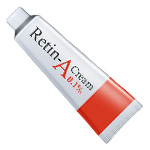Buy Retino-a Cream

Retino-a Cream Description
Retino-A Cream can be used for the treatment of acning and severe acning. It contains Vitamin A which can be used to improve acne vulgaris.
Retino-A Cream also helps to unblock pores and increase the turnover of the skin cells.
Retin-A is applied to the skin to treat mild to moderate acne or to treat the effects of aging on the face, such as fine lines, wrinkles, or "age spots". It promotes peeling of affected skin areas and unclogs pores.
Retin-A works by reducing the production of sebum, the oily substance produced by the skin. Sebum can block pores leading to spots, blackheads and inflammation.
Retino-A Cream may also be used for purposes other than those listed.
Generic name of Retino-A Cream is Tretinoin.
Retino-A Cream is also known as Tretinoin, Avita, Renova, Aberela.
Retino-a Cream Dosage
Retino-A Cream is available in:
- Standard Dosage
Follow the directions for using this medicine provided by your doctor. Use Retino-A Cream exactly as directed.
Retin-A is usually applied once a day at bedtime.
Your acne may get worse during the first 7-10 days that you use this medication. Nevertheless, continue to use it; the acne sores should disappear. Usually 2-3 weeks of regular use of Retin-A is required before improvement is seen.
Use only nonmedicated cosmetics on cleansed skin. Do not use topical preparations with a lot of alcohol, menthol, spices, or lime (e.g., shaving lotions, astringents, and perfumes); they can sting your skin.
If you are to apply any form of Retin-A, follow these steps:
1.Wash your hands and affected skin area thoroughly with mild, bland soap (not medicated or abrasive soap or soap that dries the skin) and water.
2.To be sure that your skin is thoroughly dry, wait 20-30 minutes before applying Retin-A.
3.Use clean fingertips, a gauze pad, or a cotton swab to apply the medication.
4.Use enough medication to cover the affected area lightly. Do not oversaturate the gauze pad or cotton swab.
Apply the medication to the affected skin area only (e.g., skin with acne sores).
Retino-a Cream Missing of dose
Do not take double dose. If you miss a dose you should take it as soon as you remember about your missing. If it is the time for the next dose you should continue your regular dosing schedule.
Retino-a Cream Overdose
If you overdose Retino-A Cream and you don't feel good you should visit your doctor or health care provider immediately.
Retino-a Cream Storage
Store at a room temperature between 15 and 30 degrees C (59 and 86 degrees F) away from moisture and heat. Throw away the after the expiration date. Keep out of the reach of children.
Retino-a Cream Side effects
Retino-A Cream has its side effects. The most common are:
- burning
- warmth, stinging, tingling
- itching
- redness
- swelling
- dryness, peeling, irritation
- discolored skin
Less common but more serious side effects during taking Retino-A Cream:
- allergy reactions (rash; hives; itching; difficulty breathing; tightness in the chest; swelling of the mouth, face, lips, or tongue; excessive itching; dizziness)
Side effects manifestations are not only depend on medicine you are taking but also depend on your health state and on the other factors.
Retino-a Cream Contra-indications
You should not use Retino-A Cream if you are allergic to .
It is not known whether Retino-A Cream will harm an unborn baby. Do not use this medicine without your doctor's advice if you are pregnant or breast-feeding.
Be careful with Retino-A Cream if you are taking: a diuretic (water pill); tetracycline (Sumycin, Panmycin, Robitet), minocycline (Minocin), doxycycline (Doryx, Vibramycin), demeclocycline (Declomycin), and others; an antibiotic such as ciprofloxacin (Cipro), ofloxacin (Floxin), and others; a sulfa drug such as Bactrim, Septra, Cotrim, and others; or chlorpromazine (Thorazine), prochlorperazine (Compazine), fluphenazine (Permitil, Prolixin), promethazine (Phenergan, Promethegan), perphenazine (Trilafon), and others.
Avoid exposure to sunlight or artificial UV rays (sunlamps or tanning beds). Retin-A can make your skin more sensitive to sunlight and sunburn may result.
Avoid using skin products that can cause irritation, such as harsh soaps, shampoos, or skin cleansers, hair coloring or permanent chemicals, hair removers or waxes, or skin products with alcohol, spices, astringents, or lime. Do not use other medication skin products unless your doctor has told you to.
Avoid getting Retin-A in your eyes, mouth, and nose, or on your lips. If it does get into any of these areas, wash with water.
Do not use Retin-A on sunburned, windburned, dry, chapped, irritated, or broken skin.
Also avoid using this medication in wounds or on areas of eczema. Wait until these conditions have healed before using Retin-A.
Do not stop taking Retino-A Cream suddenly.
Retino-a Cream Frequently asked questions
Q: What is Retino-A Cream?
A: Retino-A Cream is a topical (applied to the skin) form of vitamin A that helps the skin renew itself. Retino-A Cream is applied to the skin to treat mild to moderate acne or to treat the effects of aging on the face, such as fine lines, wrinkles, or "age spots".
Q: What are the most serious side effects?
A: Stop using this medication and get emergency medical help if you have any of these signs of an allergic reaction to Retin-A: hives; difficulty breathing; swelling of your face, lips, tongue, or throat.
Q: What should I do in case of overdose?
A: If you overdose Retino-A Cream and you don't feel good you should visit your doctor or health care provider immediately.
Buy Retino-a Cream
Buy Retino-a Cream online, buy Retino-a Cream online without a prescription, buy Retino-a Cream without prescription, buy Retino-a Cream cheap, buy Retino-a Cream without a prescription, buy Retino-a Cream from Canada, buy Retino-a Cream Canada, order Retino-a Cream online, order Retino-a Cream online no prescription, order Retino-a Cream without prescription, Retino-a Cream oral pill